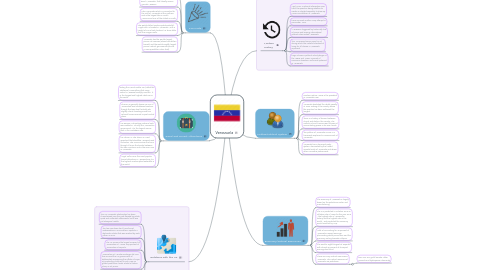Venezuela
par julia wu


1. Fun Facts
1.1. In Venezuela summer is every day of the year because the country only has two weather seasons: the hot and dry season and the hot and wet season.
1.2. Venezuela’s name comes from the Italian word “Veneziola” that literally means “piccola Venezia”.
1.3. Lake Maracaibo which is connected to the Gulf of Venezuela at the northern end is the largest lake in South America and one of the oldest on earth.
1.4. The world’s tallest uninterrupted waterfall, Angel Falls, is located in Venezuela. With a height of 3,212 feet it’s about 15 times taller than the Niagara Falls.
1.5. Venezuela has the world’s largest proven oil reserves (almost 300 billion barrels) and the world’s eighth largest proven natural gas reserves (almost 21,000 quadrillion cubic feet).
2. Travel and Tourist Attractions
2.1. Riding the Merida Cable Car (called the Teleférico) is something that every visitor to Venezuela simply must do. It is the longest and highest cable car in the world.
2.2. Choroni is generally known as one of Venezuela’s best Caribbean beaches, though the town itself actually sits slightly inland, boasting some fine colonial houses around a quiet central plaza.
2.3. Los Roques Archipelago National Park was created in 1972 by the Venezuelan government. It is the largest marine park in the Caribbean Sea.
2.4. Los Llanos, or The Plains, is a vast grassland that straddles Venezuela and Columbia. The Orinoco River that runs through it forms the border between the two countries, and is the main river in Venezuela.
2.5. Angel Falls is one the most popular tourist attractions in Venezuela as it is the highest uninterrupted waterfalls in the world.
3. Relations with the US
3.1. The US-Venezuela relationship has been characterised over the past decade by public spats and outlandish statements, but it was not always so hostile.
3.2. The two countries don't have formal ambassadors in one another's capitals, a diplomatic status that was revoked by each nation in 2010.
3.3. The US remains the largest recipient of Venezuelan oil - some 40% percent of Venezuelan oil exports.
3.4. Venezuelan Oil Minister Euologio del Pino has accused the US government of deliberately scuppering the efforts of major oil-producing countries to put a cap on global production levels amidst a historic slump in oil prices.
3.5. Relations between the U.S. and Venezuela have been fraught for years, with Venezuelan leaders routinely accusing the U.S. of coup attempts.
4. Modern History
4.1. April 1999, a national referendum was held, the question being whether to create an elected assembly to draw up a new Constitution of Venezuela.
4.2. Pérez survived another coup attempt in November 1992.
4.3. A recession triggered by historically low oil prices and soaring international interest rates rocked Venezuela.
4.4. The 1970s were boom years for oil, during which the material standard of living for all classes in Venezuela improved.
4.5. Hugo Chávez's political activity began in the 1980s and 1990s, a period of economic downturn and social upheaval in Venezuela.
5. Economy/Natural Resources
5.1. The economy of Venezuela is largely based on the petroleum sector and manufacturing.
5.2. The IMF predicted in October 2015 an inflation rate of 159% for the year 2015 - the highest rate in Venezuelan history and the highest rate in the world - and predicted the economy would contract by 10%.
5.3. With oil accounting for 95 percent of Venezuela's export earnings, plummeting world prices have sent the economy reeling towards collapse.
5.4. The world's eighth-largest oil exporter with almost 90 percent of its export earnings tied to oil.
5.5. There are many natural resources in Venezuela. The natural resources of Venezuela are petroleum.
5.5.1. Gas, iron ore, gold, bauxite, other minerals and hydropower, diamonds
